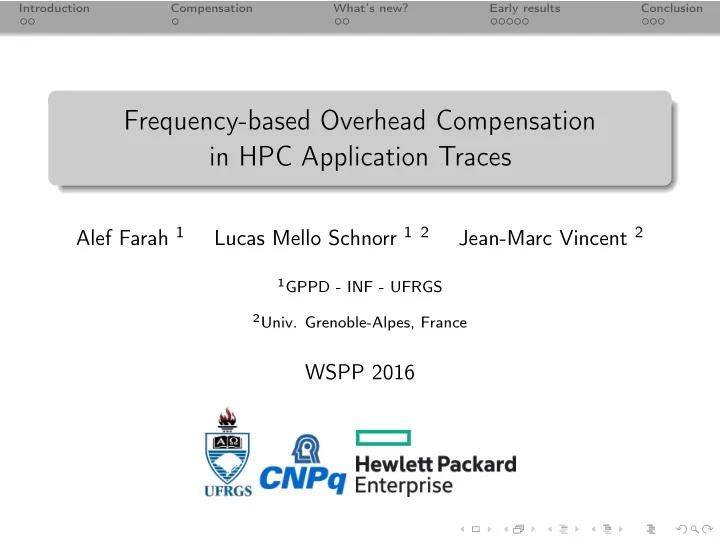

Introduction Compensation What’s new? Early results Conclusion Frequency-based Overhead Compensation in HPC Application Traces Alef Farah 1 Lucas Mello Schnorr 1 2 Jean-Marc Vincent 2 1 GPPD - INF - UFRGS 2 Univ. Grenoble-Alpes, France WSPP 2016
Introduction Compensation What’s new? Early results Conclusion Application tracing Performance analysis Logging of significant events Unique identifiers (timestamp) Chronological order Parallel and distributed applications
Introduction Compensation What’s new? Early results Conclusion Overhead in traces? Additional instructions! Direct perturbations Logging overhead
Introduction Compensation What’s new? Early results Conclusion Overhead in traces? Additional instructions! Direct perturbations Logging overhead → log less
Introduction Compensation What’s new? Early results Conclusion Overhead in traces? Additional instructions! Direct perturbations Logging overhead → log less → compensation
Introduction Compensation What’s new? Early results Conclusion Overhead in traces? Additional instructions! Direct perturbations Logging overhead → log less → compensation Indirect perturbations Compilier optimizations
Introduction Compensation What’s new? Early results Conclusion Overhead in traces? Additional instructions! Direct perturbations Logging overhead → log less → compensation Indirect perturbations Compilier optimizations → binary instrumentation
Introduction Compensation What’s new? Early results Conclusion Overhead in traces? Additional instructions! Direct perturbations Logging overhead → log less → compensation Indirect perturbations Compilier optimizations → binary instrumentation Cache, CPU optimizations
Introduction Compensation What’s new? Early results Conclusion Compensation and overhead measurement event i a = event i-1 + (event i m - event i-1 m ) - O a Isolate the logging routine Take enough measurements Produce an estimator (e.g. mean)
Introduction Compensation What’s new? Early results Conclusion Compensation and overhead measurement event i a = event i-1 + (event i m - event i-1 m ) - O a Isolate the logging routine Take enough measurements Produce an estimator (e.g. mean) Very fast routines → high variability
Introduction Compensation What’s new? Early results Conclusion Frequency Logging overhead is a function of the logging frequency . The difference may be small, the error is cumulative . Also How high is the variability? What can be done about it?
Introduction Compensation What’s new? Early results Conclusion Notes Mean frequency for the entire trace Regular applications MPI
Introduction Compensation What’s new? Early results Conclusion Metrics How to compare with previous methods? Total execution time Space/time view
Introduction Compensation What’s new? Early results Conclusion Platform 2 NUMA nodes Intel Xeon E5-2630 (24 PU total) 32 GB RAM OpenMPI 1.6.5 Shared memory Linux 3.16.0-51 (Ubuntu 14.04.1), GCC 4.8
Introduction Compensation What’s new? Early results Conclusion Applications OSU Microbenchmarks v5.2 ( osu_multi_lat ) Ondes3D v1.1
Introduction Compensation What’s new? Early results Conclusion OSU Microbenchmarks Execution Mean Standard error UnInstrumented 12.9576502561 0.280464331573357 Instrumented 13.1024921894073 0.176561479255295 Traditional 13.0582891357813 0.176510576519728 Frequency 12.9450804535228 0.176508398007264
Introduction Compensation What’s new? Early results Conclusion Ondes3D 15 10 Compensated 5 Process Identification 0 15 10 Original 5 0 5.30 5.32 5.34 5.36 Runtime (seconds) bytes 20000 25000 30000 35000 MPI_Barrier MPI_Comm_rank MPI_Finalize MPI_Recv MPI_Wait routine MPI_Comm_dup MPI_Comm_size MPI_Isend MPI_Reduce MPI_Wtime
Introduction Compensation What’s new? Early results Conclusion Conclusion Execution time is a function of the frequency Care should be taken with measurement variability Encouraging results using coarse metric Inconclusive results using fine grain metric
Introduction Compensation What’s new? Early results Conclusion Future work Test traces with higher intrusion Tests in a networked environment Tests with tools with a higher intrusion Search for a fine grain metric Investigation with irregular applications
Introduction Compensation What’s new? Early results Conclusion Thank you for the attention! The results reported in this study were generated in virtue of the agreement between Hewlett Packard Enterprise (HPE) and the Federal University of Rio Grande do Sul (UFRGS), financed by resources in return for the exemption or reduction of the IPI tax, granted by Brazilian Law nº 8248, 1991, and its subsequent updates. This investigation also receives funds from the H2020 program EU and MCTI / RNP-Brazil through HPC4E project with code 689772, the FAPERGS / Inria ExaSE design, universal design CNPq 447311 / 2014-0, and international CNRS / LICIA laboratory.
Recommend
More recommend